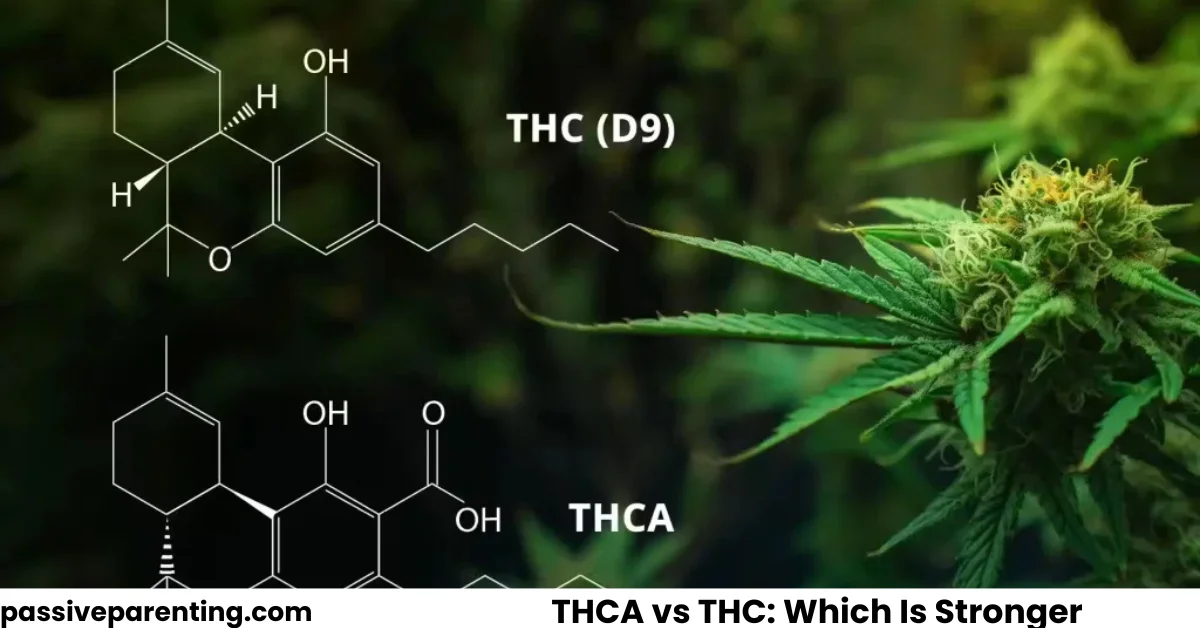The world of cannabis can be confusing, especially when it comes to understanding the compounds inside the plant. Among the many cannabinoids, THCA and THC are two that often spark curiosity and debate. Both are naturally found in cannabis, and both play a major role in how the plant affects your body.
But when it comes to THCA vs THC which is stronger, the answer depends on what kind of “strength” you’re talking about, psychoactive power, therapeutic potential, or chemical potency.
This guide explains the differences between THCA and THC, how one turns into the other, and what that means for strength, safety, and use.
Understanding THCA and THC
Before comparing strength, it’s essential to understand what each compound is and how they interact with your body.
What Is THCA?
THCA, or tetrahydrocannabinolic acid, is the raw and inactive form of THC. It’s found in freshly harvested cannabis plants before any heat or light exposure. In its natural state, THCA doesn’t cause a “high.” Instead, it’s a non-psychoactive cannabinoid that only turns into THC when exposed to heat through a process called decarboxylation.
Think of THCA as the potential energy, it’s waiting to be activated. When you smoke, vape, or cook cannabis, that heat converts THCA into THC, unleashing the familiar effects associated with cannabis use.
What Is THC?
THC, or delta-9-tetrahydrocannabinol, is the main psychoactive compound in cannabis. It’s what gives users the euphoric, mind-altering feeling often associated with marijuana.
THC binds directly to CB1 receptors in the brain, influencing mood, memory, appetite, and perception. The more THC a product contains, the more intense these effects can be.
In short, THC is the active version of THCA, the compound that delivers the “high.”
How THCA Turns into THC
The transformation from THCA to THC happens through a natural chemical process known as decarboxylation.
When cannabis is exposed to heat, whether through smoking, vaping, or baking, THCA loses a carboxyl group (a carbon and two oxygen atoms). This small molecular change activates the compound, turning THCA into THC.
Without this process, THCA remains non-psychoactive. That’s why eating raw cannabis leaves won’t cause any intoxicating effects, even though they contain high levels of THCA.
THCA vs THC: Chemical and Functional Differences
Although THCA and THC share a nearly identical molecular structure, the difference of one small chemical group completely changes their behavior in the body.
| Feature | THCA | THC |
|---|---|---|
| Psychoactivity | Non-psychoactive | Psychoactive |
| Found In | Raw cannabis | Heated or aged cannabis |
| Interaction with Body | Indirect (may affect enzymes) | Directly binds to CB1 receptors |
| Primary Use | Potential wellness benefits | Recreational and therapeutic |
| Legality | Often legal in hemp form | Regulated or restricted in many places |
This single difference, psychoactivity is what defines which compound feels stronger to users.
THCA vs THC: Which Is Stronger?
When people ask THCA vs THC which is stronger, they usually refer to the intensity of effects. But “strength” can mean more than just how high you feel.
Let’s break it down by category.
1. Psychoactive Strength
In terms of psychoactive power, THC is far stronger.
THC interacts directly with cannabinoid receptors in the brain’s endocannabinoid system. This produces feelings of euphoria, altered perception, and relaxation effects THCA cannot produce on its own.
THCA, in contrast, doesn’t fit into those receptors because of its additional carboxyl group. As a result, it has no intoxicating effect.
So, if we’re measuring “strength” by how much it alters the mind or perception, THC is significantly stronger.
2. Potential Health Benefits
However, THCA may be stronger in other ways, particularly in terms of potential wellness properties.
Early research suggests that THCA may have:
- Anti-inflammatory properties that could help with joint or muscle discomfort.
- Neuroprotective effects, supporting brain and nerve health.
- Antiemetic potential, meaning it may help with nausea.
While THC has its own therapeutic uses especially for pain, appetite, and sleep, THCA offers these potential benefits without the high, making it appealing for those who want relief without psychoactive effects.
3. Potency and Activation
THC’s potency depends on how much THCA was converted during heating. If the decarboxylation process is incomplete, some THCA will remain inactive.
So, while THC feels stronger, THCA is the building block of that strength. Without THCA, there would be no THC at all.
The Effects: What You Feel from Each
The experiences between THCA and THC are vastly different.
THCA Effects
- No high or intoxication.
- Possible calmness or mild relaxation.
- Potential wellness benefits without cognitive impairment.
People who consume raw cannabis (through juicing or tinctures) do so for these mild, non-psychoactive effects.
THC Effects
- Euphoria and relaxation.
- Changes in mood, focus, or perception.
- May relieve discomfort, stress, or nausea.
- Can cause anxiety, dizziness, or paranoia in high doses.
THC’s effects depend on dose, tolerance, and strain but overall, it’s the stronger compound in terms of mind-altering power.
THCA vs THC: Which Is Better for You?
The right compound depends on your goals and comfort level.
- Choose THCA if you want to experience the potential therapeutic effects of cannabis without getting high. It’s ideal for people who value clarity, focus, or wellness without intoxication.
- Choose THC if you’re seeking stronger psychoactive effects or symptom relief related to pain, appetite, or sleep, under proper medical guidance.
Both have their place, and neither is inherently “better.” It’s all about what you need.
Methods of Consumption
The way you consume these compounds affects their strength and outcome.
THCA Consumption
- Raw cannabis juice or smoothies: Provides THCA without heating.
- Capsules or tinctures: Offer measured, non-psychoactive doses.
- Topicals: May help with localized discomfort or inflammation.
THC Consumption
- Smoking or vaping: Fast onset of effects through decarboxylation.
- Edibles: Slower onset but longer-lasting results.
- Oils or tinctures: Controlled doses with flexible usage.
The key difference is heat. Once THCA is exposed to high temperatures, it becomes THC, changing its strength and effects.
THCA and THC: Legal Differences
Legality plays a big role in how you can access each compound.
- THCA: Because it’s non-psychoactive, it often falls under the category of hemp-derived products and may be legally sold in many regions. However, once it converts into THC through heating, it can become a controlled substance.
- THC: Heavily regulated in many countries and U.S. states. It’s only legal where medical or recreational cannabis is permitted.
Always check your local laws, as the difference between legal and illegal may depend on whether THCA has been “activated” into THC.
Chemical Potency: The Science of Strength
Chemically speaking, THCA and THC have almost identical structures, but their functions differ because of how they bind (or don’t bind) to the brain’s cannabinoid receptors.
- THCA: Can’t pass the blood-brain barrier effectively, which limits psychoactivity.
- THC: Fits perfectly into CB1 receptors in the brain, producing immediate psychological effects.
That’s why even a small amount of THC feels “strong,” while THCA feels neutral.
Interestingly, THCA can still enhance the effects of THC when both are present, a phenomenon known as the entourage effect, where multiple cannabinoids work together to produce balanced benefits.
How Long Do They Stay in Your System?
THC and THCA can both be detected in the body, though in different ways.
- THC: Stored in body fat and detectable for days or weeks, depending on use frequency.
- THCA: Present in raw form and may show up in sensitive tests, but it’s less likely to cause positive drug test results since it’s inactive.
However, since THCA can turn into THC under heat, users should always exercise caution.
Safety and Side Effects
While both compounds are considered safe when used responsibly, their effects differ.
- THCA: Generally well-tolerated with minimal side effects, though research is still emerging.
- THC: May cause dry mouth, red eyes, dizziness, anxiety, or short-term memory issues, especially in high doses.
The “stronger” compound isn’t always the “better” one, moderation and awareness are key to avoiding unwanted reactions.
The Future of THCA and THC Research
The cannabis industry is rapidly evolving, and both THCA and THC are at the forefront of new discoveries. Scientists are exploring how these compounds can be used for wellness and medical applications.
The biggest takeaway? THCA may play a larger role in non-intoxicating cannabis therapies of the future, while THC remains the cornerstone for those seeking stronger psychoactive or pain-relief effects.
As the science grows, so will our understanding of how these compounds can work together to support health, balance, and quality of life.
Conclusion:
So, THCA vs THC which is stronger? The answer depends on what kind of strength you mean.
Both compounds serve unique purposes, and understanding them helps you make informed, responsible choices. Whether you prefer the non-intoxicating calm of THCA or the potent experience of THC, the key is awareness knowing what you’re consuming, why, and how it affects your body.
In the end, “stronger” doesn’t just mean more powerful, it means more suited to your goals.
THCA and THC each hold their own kind of strength, one in potential, the other in experience.


